-
 Bitcoin
Bitcoin $82,683.4967
0.78% -
 Ethereum
Ethereum $1,829.2967
1.42% -
 Tether USDt
Tether USDt $0.9999
-0.02% -
 XRP
XRP $2.0967
-0.75% -
 BNB
BNB $606.5472
1.02% -
 Solana
Solana $125.0276
0.61% -
 USDC
USDC $1.0000
-0.01% -
 Dogecoin
Dogecoin $0.1676
0.95% -
 Cardano
Cardano $0.6650
1.26% -
 TRON
TRON $0.2382
2.59% -
 Toncoin
Toncoin $4.1025
5.56% -
 Chainlink
Chainlink $13.5754
1.83% -
 UNUS SED LEO
UNUS SED LEO $9.1395
0.29% -
 Stellar
Stellar $0.2651
-0.15% -
 Avalanche
Avalanche $18.8485
0.75% -
 Shiba Inu
Shiba Inu $0.0...01250
0.76% -
 Sui
Sui $2.2808
-1.77% -
 Hedera
Hedera $0.1640
-1.56% -
 Polkadot
Polkadot $4.0427
0.61% -
 Litecoin
Litecoin $83.3594
-2.70% -
 MANTRA
MANTRA $6.2703
0.56% -
 Bitcoin Cash
Bitcoin Cash $304.1339
1.64% -
 Bitget Token
Bitget Token $4.5229
-1.25% -
 Dai
Dai $0.9999
-0.02% -
 Ethena USDe
Ethena USDe $0.9998
-0.03% -
 Pi
Pi $0.7229
-6.19% -
 Hyperliquid
Hyperliquid $13.0555
5.79% -
 Monero
Monero $215.2463
-1.28% -
 Uniswap
Uniswap $6.0107
2.74% -
 Aptos
Aptos $5.2988
0.53%
How to evaluate the security of Bitcoin wallet storage solutions?
Secure Bitcoin wallet selection is crucial; hardware wallets offer the highest security, while software and web wallets present varying vulnerabilities. Thorough evaluation of features like private key management, MFA, and security audits is paramount before choosing a wallet.
Mar 25, 2025 at 10:29 am
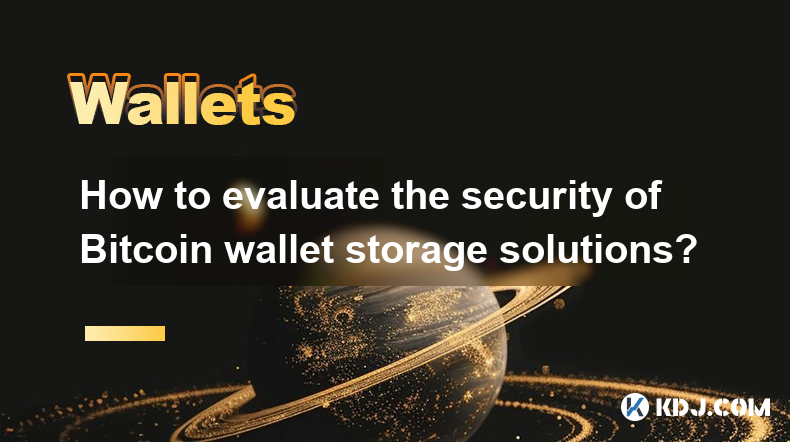
How to Evaluate the Security of Bitcoin Wallet Storage Solutions?
Choosing a secure Bitcoin wallet is crucial for protecting your cryptocurrency holdings. The security of your Bitcoin depends entirely on the security of your chosen wallet. Different wallets offer varying levels of security, making careful evaluation paramount. This article explores key factors to consider when assessing the security of various Bitcoin wallet storage solutions.
Understanding Wallet Types and Their Security Implications
Before diving into security evaluations, understanding the different types of Bitcoin wallets is vital. Each type presents a unique security profile. We have hardware wallets, software wallets (desktop and mobile), and web wallets.
- Hardware Wallets: These physical devices store your private keys offline, providing the highest level of security against hacking and malware. However, physical loss or damage remains a concern.
- Software Wallets: These wallets store your private keys on your computer or mobile device. While convenient, they are vulnerable to malware, operating system compromises, and device theft. Desktop wallets offer a bit more security than mobile ones, generally.
- Web Wallets: These are online wallets provided by third-party services. They are convenient but inherently less secure, as your private keys are stored on a server controlled by a third party. This exposes you to potential hacking and platform vulnerabilities.
Evaluating Security Features: A Detailed Breakdown
Several key features directly impact a Bitcoin wallet's security. Carefully analyzing these features is critical before choosing a wallet.
- Private Key Management: How are private keys generated, stored, and managed? Strong encryption and secure key generation processes are vital. Look for wallets that offer multiple signature options for enhanced security.
- Multi-Factor Authentication (MFA): Does the wallet support MFA? This adds an extra layer of security, requiring more than just a password to access your funds. Consider wallets that offer both hardware and software-based MFA options.
- Backup and Recovery: What options are available for backing up and recovering your wallet if your device is lost or damaged? A robust backup and recovery system is crucial for mitigating potential losses. Seed phrases are critical here.
- Security Audits: Has the wallet software undergone independent security audits? Reputable wallets will openly share audit reports demonstrating their security practices.
- Reputation and Track Record: Choose wallets from established providers with a proven track record of security and reliability. Research user reviews and look for evidence of past security breaches or vulnerabilities.
- Open-Source Code: For software wallets, consider those with open-source code. This allows independent security researchers to review the code for vulnerabilities, enhancing overall security.
Specific Security Considerations for Different Wallet Types
Let's delve deeper into security considerations specific to each wallet type.
- Hardware Wallet Security: Prioritize wallets with tamper-evident seals and robust firmware updates. Regularly check for firmware updates to patch any known vulnerabilities. Never share your seed phrase with anyone.
- Software Wallet Security: Install antivirus and anti-malware software on your device. Keep your operating system and wallet software up to date with the latest security patches. Avoid downloading wallets from untrusted sources.
- Web Wallet Security: Choose reputable web wallets with a strong security track record. Be cautious about phishing attempts and only access your wallet through trusted links. Consider using a VPN for added privacy.
Beyond the Wallet: Protecting Your Bitcoin
Even with a secure wallet, other practices contribute significantly to overall security.
- Strong Passwords: Use strong, unique passwords for your wallet and associated accounts. Consider using a password manager to help manage these passwords securely.
- Secure Internet Connection: Always access your wallet through a secure internet connection, preferably a VPN, to protect against man-in-the-middle attacks.
- Regular Security Reviews: Regularly review your wallet's security settings and practices. Stay updated on the latest security threats and best practices.
- Cold Storage: For long-term storage, consider cold storage, which involves storing your private keys offline, significantly reducing the risk of theft or hacking.
Common Questions and Answers
Q: What is a seed phrase, and why is it so important?
A: A seed phrase is a list of words that acts as a backup for your wallet's private keys. If you lose access to your wallet, your seed phrase allows you to restore it and access your funds. It's crucial to keep it safe and secure, as anyone with your seed phrase can access your Bitcoin.
Q: Are all hardware wallets equally secure?
A: No. While hardware wallets generally offer the highest level of security, the specific security features vary between different models and manufacturers. Some have better tamper resistance, more robust firmware, or more advanced security features. Research thoroughly before choosing a hardware wallet.
Q: How often should I update my wallet software?
A: Regularly update your wallet software to benefit from the latest security patches and bug fixes. The frequency depends on the wallet provider's release schedule, but generally, updating as soon as updates are available is recommended.
Q: What is the best way to protect my seed phrase?
A: Store your seed phrase offline in a safe and secure location. Consider using a metal plate, splitting the seed phrase across multiple locations, or using a secure physical document. Never store it digitally.
Q: Can I use the same password for multiple wallets?
A: No. Using the same password for multiple wallets significantly increases your risk if one wallet is compromised. Always use unique, strong passwords for each wallet.
Disclaimer:info@kdj.com
The information provided is not trading advice. kdj.com does not assume any responsibility for any investments made based on the information provided in this article. Cryptocurrencies are highly volatile and it is highly recommended that you invest with caution after thorough research!
If you believe that the content used on this website infringes your copyright, please contact us immediately (info@kdj.com) and we will delete it promptly.
- Bitcoin (BTC) price dips below ascending channel pattern as whales mirror a 2020 bull run signal
- 2025-04-01 07:50:12
- Mutuum Finance (MUTM) Has Been Relatively Quiet, But It's Building Fast
- 2025-04-01 07:50:12
- Cardano (ADA) Gains 4% This Week, Trading at $0.74 as Bullish Pressure Builds
- 2025-04-01 07:45:12
- Elon Musk Quashes Rumors of U.S. Government Using Dogecoin (DOGE) in Any Kind of Operations
- 2025-04-01 07:45:12
- Ethereum (ETH) and Solana (SOL) Prices Could Plunge as FTX Begins Creditor Repayments on May 30
- 2025-04-01 07:40:12
- Acting SEC Chair Rejects Enforcement, First US Bank-Issued Stablecoin, Bitcoin's Four-Year Cycle at Crossroads
- 2025-04-01 07:40:12
Related knowledge
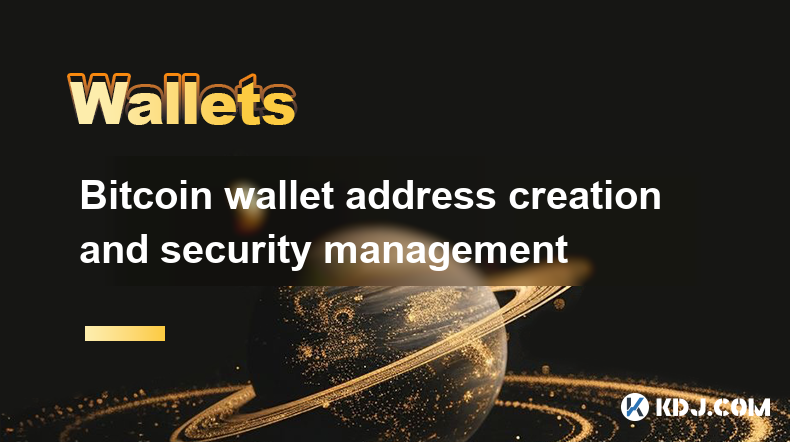
Bitcoin wallet address creation and security management
Mar 31,2025 at 10:56pm
Understanding Bitcoin Wallet AddressesA Bitcoin wallet doesn't store Bitcoin directly. Instead, it stores private keys which are long strings of characters. These keys grant access to your Bitcoin. Your public key, derived from the private key, is used to generate your Bitcoin wallet address, a unique identifier similar to a bank account number. This a...

How to easily generate a Bitcoin payment address
Mar 29,2025 at 10:49am
Generating a Bitcoin payment address might seem daunting, but it's actually quite straightforward. This process is crucial for receiving Bitcoin, as each transaction requires a unique address. Understanding how this works is fundamental to using Bitcoin effectively. This guide will walk you through the simple steps, regardless of your technical experti...
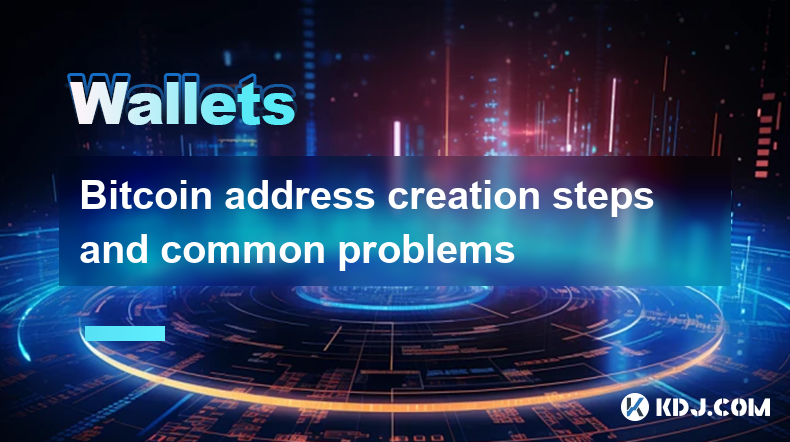
Bitcoin address creation steps and common problems
Mar 30,2025 at 06:07am
Understanding Bitcoin AddressesA Bitcoin address is a unique identifier, similar to a bank account number, used to receive Bitcoin. It's a string of alphanumeric characters generated from a public key, derived from your private key. Understanding the distinction between public and private keys is crucial for Bitcoin security. Your private key should be...
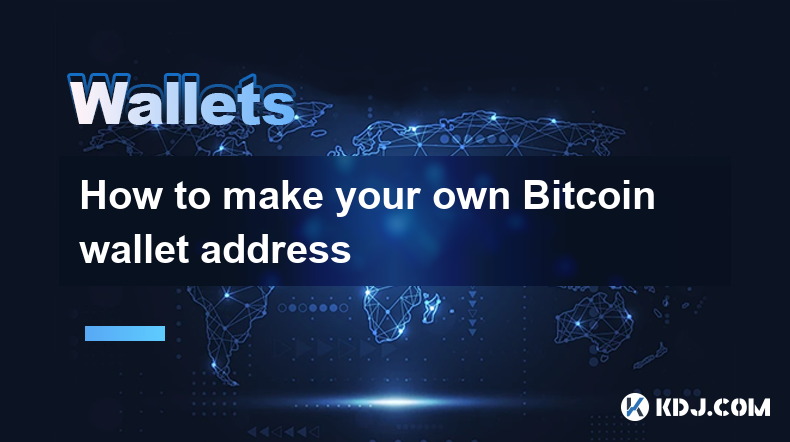
How to make your own Bitcoin wallet address
Mar 29,2025 at 08:42pm
Creating your own Bitcoin wallet address is crucial for securing and managing your Bitcoin holdings. It allows you to independently receive and send Bitcoin without relying on third-party services. This process involves understanding the different types of wallets and choosing the one that best suits your needs and technical expertise. Incorrectly gene...
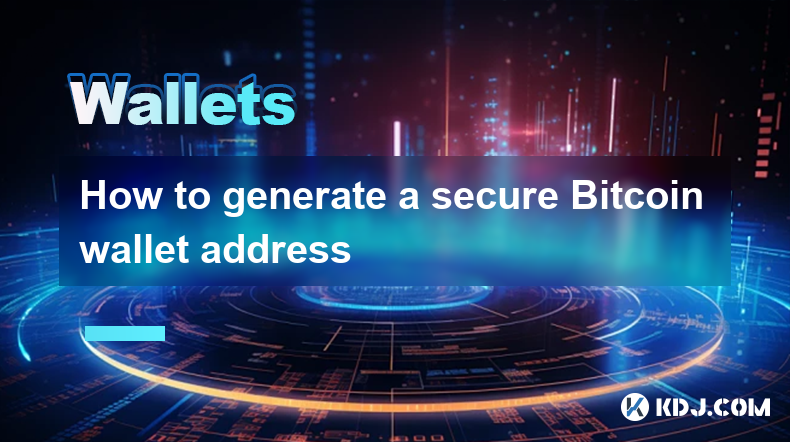
How to generate a secure Bitcoin wallet address
Apr 01,2025 at 03:14am
Understanding Bitcoin Wallet AddressesA Bitcoin wallet doesn't actually store your Bitcoin. Instead, it stores your private keys, which are long strings of characters that grant you access to your Bitcoin. Your public key, derived from your private key, is used to generate your Bitcoin address, a unique identifier similar to a bank account number. This...
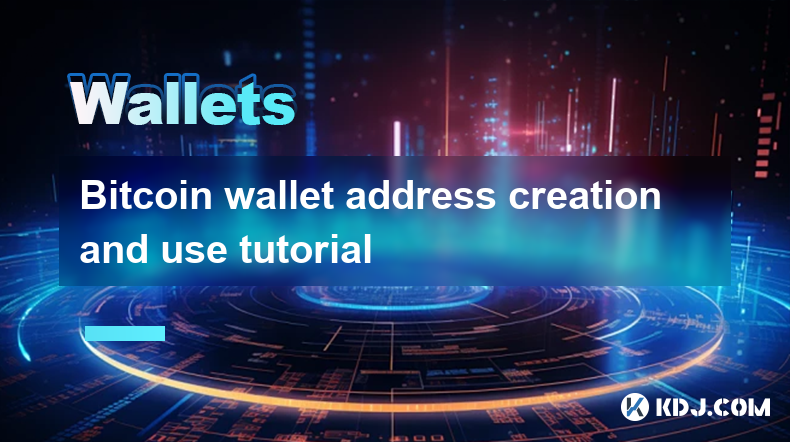
Bitcoin wallet address creation and use tutorial
Mar 29,2025 at 10:14pm
Understanding Bitcoin Wallet AddressesA Bitcoin wallet doesn't store Bitcoin in the way a traditional bank account does. Instead, it stores private keys, which are cryptographic secrets allowing you to access and spend your Bitcoin. Your Bitcoin address, on the other hand, is a public identifier, like an email address, that others can use to send you B...

Bitcoin wallet address creation and security management
Mar 31,2025 at 10:56pm
Understanding Bitcoin Wallet AddressesA Bitcoin wallet doesn't store Bitcoin directly. Instead, it stores private keys which are long strings of characters. These keys grant access to your Bitcoin. Your public key, derived from the private key, is used to generate your Bitcoin wallet address, a unique identifier similar to a bank account number. This a...

How to easily generate a Bitcoin payment address
Mar 29,2025 at 10:49am
Generating a Bitcoin payment address might seem daunting, but it's actually quite straightforward. This process is crucial for receiving Bitcoin, as each transaction requires a unique address. Understanding how this works is fundamental to using Bitcoin effectively. This guide will walk you through the simple steps, regardless of your technical experti...

Bitcoin address creation steps and common problems
Mar 30,2025 at 06:07am
Understanding Bitcoin AddressesA Bitcoin address is a unique identifier, similar to a bank account number, used to receive Bitcoin. It's a string of alphanumeric characters generated from a public key, derived from your private key. Understanding the distinction between public and private keys is crucial for Bitcoin security. Your private key should be...

How to make your own Bitcoin wallet address
Mar 29,2025 at 08:42pm
Creating your own Bitcoin wallet address is crucial for securing and managing your Bitcoin holdings. It allows you to independently receive and send Bitcoin without relying on third-party services. This process involves understanding the different types of wallets and choosing the one that best suits your needs and technical expertise. Incorrectly gene...

How to generate a secure Bitcoin wallet address
Apr 01,2025 at 03:14am
Understanding Bitcoin Wallet AddressesA Bitcoin wallet doesn't actually store your Bitcoin. Instead, it stores your private keys, which are long strings of characters that grant you access to your Bitcoin. Your public key, derived from your private key, is used to generate your Bitcoin address, a unique identifier similar to a bank account number. This...

Bitcoin wallet address creation and use tutorial
Mar 29,2025 at 10:14pm
Understanding Bitcoin Wallet AddressesA Bitcoin wallet doesn't store Bitcoin in the way a traditional bank account does. Instead, it stores private keys, which are cryptographic secrets allowing you to access and spend your Bitcoin. Your Bitcoin address, on the other hand, is a public identifier, like an email address, that others can use to send you B...
See all articles























































































